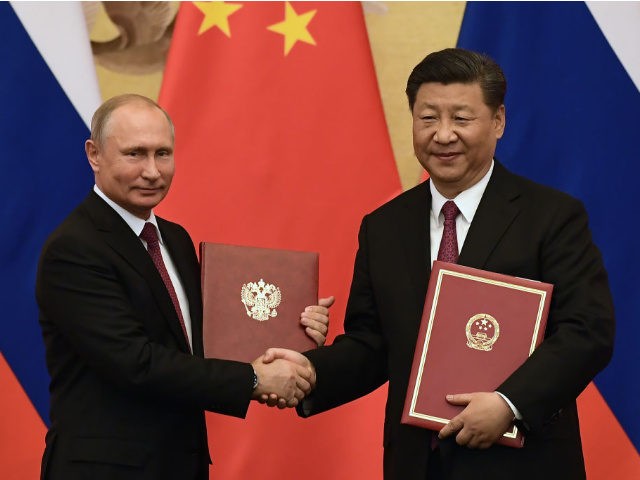Chinese state media expressed anxiety about Russian President Vladimir Putin’s meeting with U.S. President Joe Biden on Wednesday, pumping out editorials that cajoled and bullied Moscow into staying on the same page as Beijing so the two authoritarian regimes can form a new axis of global power.
China’s state-run Global Times combed through Putin’s interview with NBC News to quibble with every negative mention of China and breathlessly reminding the Russian president that “security pressure” from the U.S. has “driven Beijing and Moscow closer.”
“How clumsy and ridiculous the U.S. elites are by wanting to convince Russia with the so-called China threat!” the Global Times wrote.
The Chinese paper took some solace in Putin asserting that “attempts at destroying the relationship between Russia and China” would fail because Moscow does not believe “China is a threat to us.”
“China is a friendly nation. It has not declared us an enemy, as the United States has done,” Putin said during the interview. That was clear enough, but the Global Times seemed very eager to convince itself that he really meant it, so it dumped one of its lengthy boilerplate tirades against American imperialism.
“What the U.S. cares about is its hegemony. Whenever any country may touch U.S. hegemony in a certain sphere, Washington will not hesitate to label the country an enemy, or opponent, or competitor, or rival, and will do its best to crack down on that country,” the Chinese state media organ reminded Putin.
Another Global Times piece on Tuesday “downplayed expectations” for the Putin-Biden meeting, predicting Biden would fail to make a dent in the ironclad alliance between Beijing and Moscow.
“China and Russia are united like a mountain, and our friendship is unbreakable,” declared Chinese Foreign Ministry spokesman Zhao Lijian. “The sky is the limit for down-to-earth China-Russia cooperation, and we are full of confidence in the development of bilateral relations.”
The Global Times fussed some more over Putin’s NBC interview, looking for proof that the Russian leader understands this divine wisdom, then quoted “Chinese analysts” who said U.S. efforts to drive a wedge between China and Russia are “hilarious, useless, and too obvious.”
“The U.S. has nothing to offer Russia, to let Moscow abandon all it got from relations with Beijing and take the risk of betraying China, while Russians have a very unfortunate and painful memory of being betrayed and fooled by the U.S.,” declared the Chinese experts.
A Russian expert, Russian Foreign Ministry academic Alexander Lukin, chipped in to say the Biden administration can only do so much to repair U.S.-Russia relations because “if they do too much, they will be criticized by the opposition, which is now represented by the Republican Party.”
The Global Times also played up the “solid and close personal relationship” between Putin and Chinese dictator Xi Jinping, which it said was “based on high-level mutual trust, similar values and broad common interests shared by the two major powers, unlike the fragile unity between the U.S. and its allies.” Also, Putin gave Xi some Russian ice cream for his birthday two years ago.
After repeating numerous times during its lengthy editorial that America has zero chance of damaging China-Russia relations, the Global Times concluded by muttering it is far more likely that China will woo European states away from the United States and leave Washington isolated on the world stage.
Many Western analysts essentially agree that China and Russia have good reasons for working together in the near term, including mutual antipathy toward the Western world and its human rights concepts. The occasional note of skepticism is sounded by those who wonder if Russia is getting nervous about China’s dominant position in Central Asia, its designs on territory also coveted by Moscow, and China’s growing influence over the Russian economy. Putin probably is not blind to China’s penchant for using such economic leverage to achieve political ends.
The Soviet Union was known to cooperate with Western powers against China in the years before the Berlin Wall came down. The Chinese occasionally cooperated with the West against the Soviets before that. Putin might not be comfortable spending the rest of his life playing a weak second fiddle to the rising Chinese hegemonic power. The aggressive regime in Beijing could push the Russians too hard on territorial disputes.

COMMENTS
Please let us know if you're having issues with commenting.